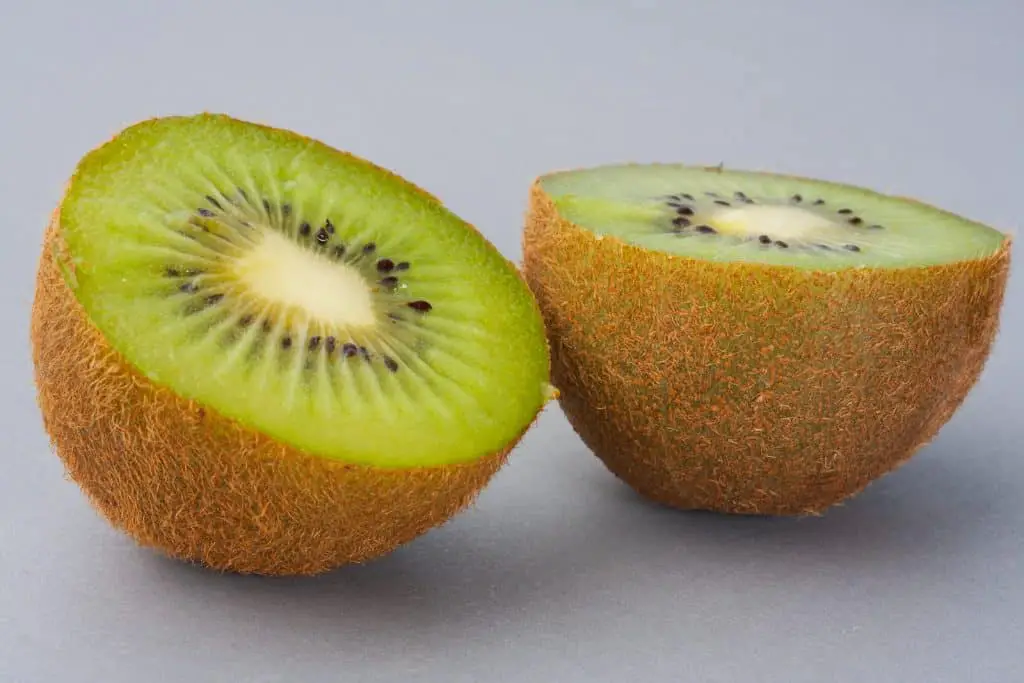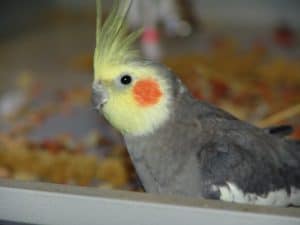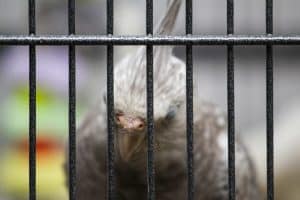Cockatiels are a type of parrot that originates from Australia. They are popular pets because of their sweet dispositions and can be relatively easy to care for. Most cockatiels enjoy eating a variety of fruits and vegetables, but can also eat seeds, nuts, and pellets. So, can cockatiels eat kiwi?
In this blog post, we’ll discuss the dietary habits of cockatiels and provide some tips on how to incorporate kiwis into their diet.
Can cockatiels eat kiwi?
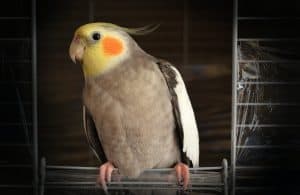
The answer is yes, cockatiels can eat kiwi! In fact, kiwis are a great source of vitamins and minerals for your pet bird. However, as with any new food, you should introduce kiwis to your cockatiel slowly and in moderation. Start by offering a small piece of kiwi once or twice a week. If your cockatiel enjoys it and has no adverse reactions, you can increase the frequency and amount of kiwi you offer.
Is kiwi good for cockatiels? (Nutritional benefits)
Kiwi is a nutritious fruit that is packed with vitamins and minerals. It is especially high in vitamin C, which is essential for a healthy immune system. Vitamin C is also important for the development of new cells, including feathers. This means that feeding your cockatiel kiwi can help promote healthy growth!
Kiwi is also a good source of fiber, which is important for digestive health. Additionally, the antioxidants in kiwi can help protect your cockatiel’s cells from damage. Overall, kiwi is a healthy fruit that can provide many nutritional benefits for your pet bird!
Can cockatiels eat kiwi daily?
Kiwis can be a healthy part of your cockatiel’s diet, but they should not be fed kiwi every day. As with any new food, it’s important to introduce kiwis slowly and in moderation. Start by offering a small piece of kiwi once or twice a week. If your cockatiel enjoys it and has no adverse reactions, you can increase the frequency and amount of kiwi you offer.
Can cockatiels eat kiwi skin?
The skin of a kiwi can be tough and difficult for your cockatiel to digest. For this reason, it’s best to remove the skin before feeding kiwi to your bird. You can do this by using a sharp knife or vegetable peeler.
Can cockatiels eat frozen kiwi?
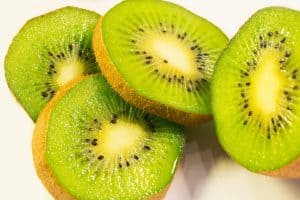
Frozen kiwi can be a refreshing treat for your cockatiel on a hot day. To prepare frozen kiwi, simply wash and cut the fruit into small pieces. Then, place the kiwi pieces in an airtight container and freeze them for several hours. When you’re ready to give your bird a treat, take out a few pieces of frozen kiwi and let them thaw for a few minutes. Your cockatiel will love this cool, refreshing snack!
Are kiwi seeds safe for cockatiels?
You can feed your cockatiel kiwi seeds, but it’s important to remove the hard outer shell first. The shell can be difficult for your bird to digest and may cause gastrointestinal problems. To remove the shell, use a sharp knife to cut through the fruit and then gently twist the two halves apart. You can then use a spoon to scoop out the seeds. Once the seeds are removed, you can cut them into small pieces and offer them to your cockatiel.
Other birds eat kiwi seeds without any problems, but if you’re worried about your cockatiel’s digestive system, you can soak the seeds in water overnight before feeding them. This will help soften the shells and make them easier for your bird to digest.
- CLEAR VIEW- The travel bird carrier has 4 large clear windows to reduce the pet bird's travel anxiety and allow you to keep an eye on your feathered friend. The removable black cloth cover helps keep your bird calm when needed.
- BREATHABLE- Made of breathable, durable, and pet-safe fabric, this small animal carrier has two approriately sized ventilation holes and anti-scratch grids that ensure airflow and comfort for your pets. It also prevents small animals from escaping through the holes.
- PRACTICAL- This bird travel cage includes a washable tray, a wooden standing perch, and a feeding cup with a wire rope to fasten securely. Youll appreciate the small mesh pocket for storing snacks or other small items.
- PORTABLE- The top padded handle and adjustable shoulder strap make it easy to carry by hand or shoulder. Side and bottom Zipper-opening makes it easy to set-up one-minute or folding and cleaning a breeze.
- DIMENSIONS- Featuring a gray color design, it is more resistant to dirt, in addition to being lightweight at 1.65 lbs, measuring 15" x 10.5" x 10.5", suitable for small to medium-sized birds such as parrots, canaries, and finches. Please measure your pet before purchasing.
- MULTI-PURPOSE USE- This carrier can also be used as a Guinea Pig Carrier, Small Animal Reptile Carrier, Hamster Carrier, Rat Carrier, Bunny Rabbit Carrier, Bearded Dragon Carrier. Perfect for vet visits, school trips, or picnics.
How to Feed Kiwi to Cockatiels
When offering kiwi to your cockatiel, it is essential to prepare the fruit carefully to ensure your pet bird can safely consume it:
1. Washing and Peeling: Thoroughly wash the kiwi fruit under running water to remove any dirt or chemical residues. It is also essential to peel the kiwi skin as most cockatiels cannot digest it, and it may cause gastrointestinal problems.
2. Cutting into Small, Bite-Sized Pieces: To avoid choking hazards, cut the kiwi flesh into small, manageable pieces that your cockatiel can easily consume.
Serving Suggestions:
1. Mixing with Other Fruits and Vegetables: To ensure your cockatiel receives a varied and balanced diet, consider combining kiwi pieces with other safe fruits and vegetables, such as apples, berries, leafy greens, and bell peppers.
2. Offering as a Treat or Reward: Kiwi can be an occasional treat for your cockatiel, and it can also be used as a reward for positive behavior during training sessions.
Monitoring Your Cockatiel’s Reaction:
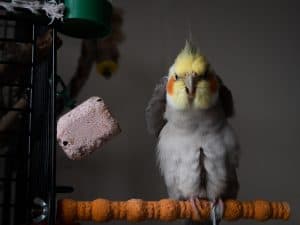
1. Allergy or Sensitivity Symptoms: Although rare, some cockatiels may be allergic or sensitive to kiwi or other citrus fruits. If your pet bird exhibits signs of distress, such as difficulty breathing or swelling, immediately discontinue feeding kiwi and consult your veterinarian for advice.
2. Adjusting the Frequency and Amount of Kiwi in Their Diet: Based on your cockatiel’s reaction to the fruit, you can determine how much kiwi and how often it can be included in their diet. Remember that moderation is key to prevent any adverse effects from excessive sugar intake.
Potential Concerns When Feeding Kiwi to Cockatiels
Although kiwi offers numerous health benefits for pet birds, there are a few potential concerns that cockatiel owners should be aware of before incorporating this fruit into their pet’s diet:
1. High Sugar Content: Kiwi, like most fruits, contains natural sugars that, when consumed in large quantities, might lead to health issues such as obesity and diabetes in cockatiels. It is crucial to feed kiwi in moderation to avoid any possible health risks associated with excessive sugar intake.
2. Pesticides and Chemicals: Non-organic kiwis may contain traces of pesticides and chemicals that can be harmful to your pet bird. It is always best to choose organic kiwi, and ensure you wash and peel the fruit carefully before feeding it to your cockatiel to minimize exposure to any harmful substances.
Recipes that include kiwi as an ingredient
Kiwi Salsa:
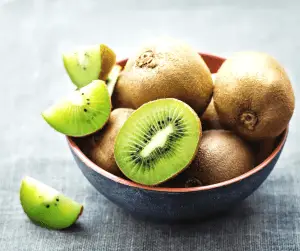
This recipe is a great way to incorporate fresh fruit kiwi into your cockatiel’s diet. It can be served as a healthy snack or used as a topping for their pellets or seed mix.
Ingredients:
– ½ cup chopped kiwi
– ¼ cup chopped tomatoes
– ¼ cup chopped onion
– ¼ cup chopped cilantro
– Juice of ½ lime
– Salt and pepper to taste
Instructions:
– Combine all ingredients in a bowl and mix well.
– Serve immediately or store in the refrigerator for later.
Kiwi Fruit Salad:
This recipe is a refreshing and healthy option for your cockatiel. It can be served as a standalone dish or used as a topper for their pellets or seed mix.
Ingredients:
– ½ cup chopped kiwi
– ¼ cup chopped pineapple
– ¼ cup chopped grapes
– ¼ cup chopped mango
– Juice of ½ lime
– Salt and pepper to taste
Instructions:
– Combine all ingredients in a bowl and mix well.
– Serve immediately or store in the refrigerator for later.
What other tropical fruits can cockatiels eat?
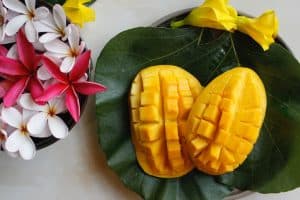
In addition to kiwi, cockatiels can also enjoy other tropical fruits such as pineapple, mango, and papaya. These fruits are a good source of vitamins and minerals and can help add variety to your cockatiel’s diet. As with any new food, introduce these fruits slowly and in moderation. Start by offering a small piece of fruit once or twice a week and increase the amount as tolerated. If your cockatiel enjoys tropical fruits, you can add them to their diet on a regular basis.
Healthy diet for cockatiels
A healthy diet for cockatiels includes a variety of fresh fruits, vegetables, pellets, and seed mix. Fruits and vegetables can be offered fresh, frozen, or canned. Pellets should make up the majority of your cockatiel’s diet and can be supplemented with a small amount of seeds. To ensure your cockatiel is getting all the nutrients they need, talk to your veterinarian about the best diet for your pet bird.
Our pet birds are important members of our family, and we want to make sure they are getting the best possible care. If you have any questions about can cockatiels eat kiwi or what to feed your pet bird, talk to your veterinarian. They can help you create a diet plan that is tailored to your cockatiel’s individual needs.
Conclusion
Kiwi is a healthy fruit that can provide many nutritional benefits for your pet bird! However, it’s important to wash the fruit thoroughly and cut it into small pieces before feeding it to your cockatiel. You should also monitor your bird closely at first in case they have an allergic reaction. If you notice any difficulty breathing or swelling of the face or throat, consult a veterinarian immediately.
